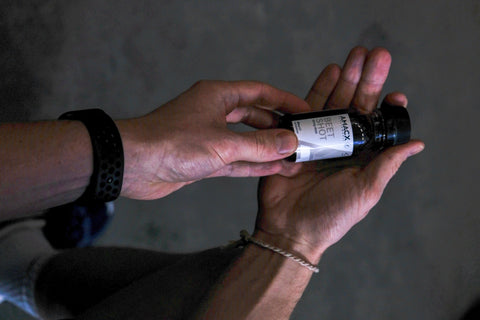Creatine is one of the best-known and most-used supplements worldwide. In the United States alone, this supplement accounts for annual sales of more than $400 million. Possibly this is because creatine is one of the most researched performance-enhancing supplements, and the scientific evidence for it is very strong. The benefits then lie mainly in increasing muscle mass through strength training. Recently, however, more directions have been found in which creatine can play a positive role. If creatine can also add value for you, read this blog.
Creatine is a substance that occurs naturally in our body, and is produced in the liver, kidneys and pancreas (daily ± 1-2 grams). We also get a small dose of creatine daily from our diet, especially from meat and fish. Some 95% of creatine is stored in the body in muscles. To store it here, creatine is first coupled to a phosphate molecule; thus the substance creatine phosphate is created. Creatine phosphate is a very important source of fuel, alongside the better-known carbohydrates and fats. However, creatine phosphate has a very specific role in fuelling our body: because it is capable of delivering energy at lightning speed, this energy source is only used for short, maximum efforts. Think of a sprint but also strength training, where you do several short, maximal repetitions.
Optimising creatine stores for improved athletic performance
The supply of creatine phosphate in our body is limited, so this fuel tank can become empty after only 10 to 15 seconds during maximum effort. As a result, the idea arose in the 1970s that supplementing creatine intake could increase this fuel supply, thus improving sports performance. Since then, a lot of scientific research has been done on this, showing that this is indeed the case. The main condition for this is that you ‘recharge’ the supply of creatine in the muscles. You can do this in two ways:
-
Quick effect: take 3 scoops of Amacx Creatine per day for 7 days to recharge quickly. You can then maintain a ‘maintenance intake’ of 1 scoop per day for 8 to 12 weeks. Always take the creatine with a meal.
-
Gradual effect: Take 1 scoop of Amacx Creatine daily for 8 to 12 weeks. This way, it takes several weeks until your muscles are fully ‘loaded’ and you have maximum effect. Always take the creatine with a meal.

Creatine as a training supplement for improved performance
However, creatine's acute effect on sports performance seems only minor. Much more important is the indirect extra training effect that creatine can provide. By being able to do an extra repetition every time in the gym, train with heavier weights or perform your sprint training just that little bit more intensively, you become just that little bit better every time you train. As a result, creatine is mainly seen as a ‘training supplement’ and less as a ‘competition supplement’.
The role of creatine in recovery and injury prevention
In addition to the performance benefits creatine can offer you, in recent years more is also becoming known about the role creatine can play in recovery and injury prevention or rehabilitation. For instance, there is evidence that your glycogen stores are replenished faster after a hard endurance exercise if you use creatine. Creatine can also reduce muscle loss during a period of inactivity, such as during rehabilitation. Finally, creatine can also play a role in concussion recovery, as there is sense brain also has a small creatine supply.
The possible disadvantages of creatine use in certain sports
Keep in mind that creatine can also provide a performance disadvantage in certain cases. This is because the extra creatine in the muscles often causes extra fluid accumulation there, which can cause up to 1kg of extra weight. This is only fluid, which you will lose within a few days once you stop using creatine. However, this extra weight can be a disadvantage in certain sports. So think about this carefully, and possibly stop your intake of creatine in time.
To sum up:
-
Creatine, together with phosphate, forms the fuel our body uses from the fastest and most explosive efforts (up to 10 to 15 seconds).
-
Taking extra creatine in supplement form increases this fuel tank. This leads to performance enhancement in strength training and (repeated) sprints, among others.
-
To obtain these effects, creatine must be recharged in the muscles. This can be done via a fast protocol (3x 1 scoop Amacx Creatine per day for 7 days, and then 1 scoop per day for 8-12 weeks) and a gradual protocol (1 scoop Amacx Creatine per day for 8-12 weeks).
-
Creatine should be seen primarily as a ‘training supplement’ to achieve the greatest performance gains indirectly, from many workouts that can be performed just a little bit better.
-
Besides the benefits creatine offers in performance, there is also increasing evidence of beneficial effects of creatine on recovery, as well as injury prevention/healing. Especially in the case of a (severe) muscle injury or concussion, the use of creatine is therefore recommended.












